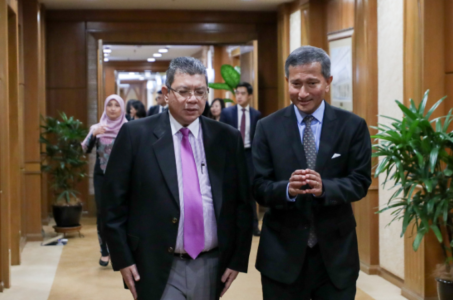Strengthened Ties and Future Collaborations Highlighted During Visit
KUALA LUMPUR: Singapore’s Foreign Minister Vivian Balakrishnan stated on Thursday (May 19) that Malaysia and Singapore have consistently proven to be steady, reliable, and trustworthy partners despite the challenges posed by the COVID-19 pandemic.
Dr. Balakrishnan made these remarks while addressing the media on the final day of his three-day working visit to Malaysia, where he engaged with senior Malaysian politicians and figures.
“The past two years have been tough for individuals on both sides of the causeway. However, one significant aspect that has emerged is the unwavering partnership between Malaysia and Singapore throughout the crisis,” he remarked.
“We ensured that our supply chains remained open, and the flow of essential services—such as food, medicine, and logistics—was uninterrupted despite the ongoing challenges,” he emphasized.
When questioned about the difficulties of maintaining and enhancing bilateral relations amid Malaysia’s political uncertainties, Dr. Balakrishnan noted that the political landscape in Malaysia has been “challenging and complex” since the 2018 General Election.
Nonetheless, he asserted that the strength of the bilateral relationship and mutual trust between Singapore and Malaysia has grown during the pandemic.
“The ability to work collaboratively and support one another during critical moments made a significant difference,” he added.
The minister also expressed that his longstanding friendship with leaders like Prime Minister Ismail Sabri Yaakob and Senior Minister Hishammuddin Hussein has facilitated effective communication for the benefit of both nations.
“I have known Prime Minister Ismail (Sabri) and Defence Minister Hishammuddin for nearly two decades. These relationships have endured both favorable and challenging times… I would say we are friends,” Dr. Balakrishnan stated.
He continued, “As political leaders, our primary responsibility is to advance the interests, security, and opportunities for our people. However, being friends with a long history of engagement allows us to communicate effectively, preventing misunderstandings and enabling us to collaborate efficiently on mutually beneficial projects.”
During his visit, Dr. Balakrishnan met with Mr. Ismail Sabri, Mr. Hishammuddin, Foreign Minister Saifuddin Abdullah, and other political leaders. He also had an audience with Deputy King Sultan Nazrin Muizzuddin Shah.
In a statement released on Wednesday, Singapore’s Ministry of Foreign Affairs announced that Dr. Balakrishnan and Mr. Ismail Sabri welcomed the complete reopening of land and air borders between the two nations.
The statement further noted that Dr. Balakrishnan and Mr. Saifuddin “reviewed ongoing bilateral cooperation, affirming that it has continued robustly even amid the pandemic and travel restrictions.”
RESTORING FULL CONNECTIVITY
On Thursday, Dr. Balakrishnan also pointed out that both nations are committed to fully restoring connectivity in the near future.
Singapore and Malaysia reopened their land borders to fully vaccinated travelers on April 1. Additionally, both countries resumed numerous flight routes, enabling travelers to bypass quarantine and COVID-19 testing.
Dr. Balakrishnan indicated that both nations are eager to elevate air travel to pre-pandemic levels.
“In terms of air travel, we are currently operating approximately 180 flights a week to five destinations across Malaysia, which is only about 40% of the pre-pandemic connectivity level of around 500 flights a week,” the minister highlighted.
“We anticipate that in the coming weeks and months, we will see a complete resumption of air connectivity,” he added.
He also mentioned that land border traffic has risen recently, particularly during long weekends, although it has not yet reached pre-COVID-19 levels. He expressed optimism for future increases.
Dr. Balakrishnan revealed that both nations are exploring ferry services between Singapore’s Tanah Merah ferry terminal and Desaru in Johor, with the services currently undergoing the necessary checks and approvals.
In late March, Malaysian Transport Minister Wee Ka Siong announced that the Desaru Coast ferry terminal is fully operational, with almost all necessary approvals secured for launching services to Singapore.
The Maritime and Port Authority of Singapore (MPA) later stated it would approve the proposed ferry service only after ensuring its safe operation.
Dr. Balakrishnan indicated that he had discussions with Malaysian counterparts about various bilateral projects, including the potential revival of the suspended Kuala Lumpur-Singapore High-Speed Rail (HSR) project.
“I believe on the Malaysian side, they are considering some new ideas. We will await their proposals and assess them with fresh perspectives,” he said.
The HSR project aimed to reduce travel time between Singapore and Kuala Lumpur to approximately 90 minutes but was discontinued after the agreement lapsed on December 31, 2020.
In September 2018, both parties agreed to postpone construction of the HSR until the end of May 2020, following Malaysia’s then-Prime Minister Mahathir Mohamad’s assessment of the country’s financial situation and the project’s lack of benefits.
Malaysia subsequently requested a further seven-month extension to facilitate discussions and evaluations of its proposed alterations to the project.
However, both sides failed to reach an agreement on new terms, including Malaysia’s request to eliminate an asset management company responsible for operating the railway, leading to the agreement’s expiration.
Malaysia compensated Singapore over S$102 million for the terminated project.
Since the agreement’s cancellation, Malaysia’s federal government has been researching the feasibility of a domestic HSR project linking Iskandar Puteri in Johor to Kuala Lumpur.








